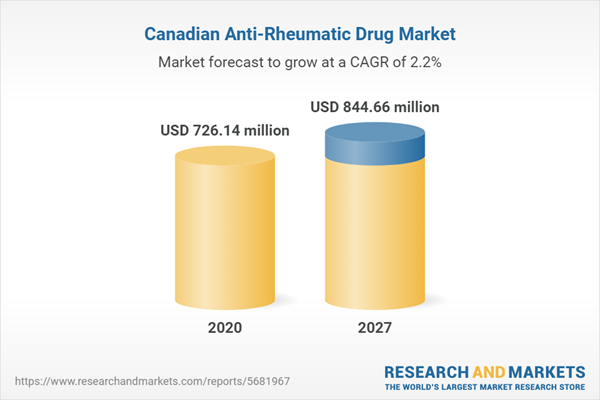The need for antirheumatic medications in Canada is mostly driven by the country's ageing population. Statistics Canada reports that there are 5.9 million Canadian senior citizens compared to 5.8 million Canadians who are 14 and under. According to the data provided by the Government of Canada, almost one in seven Canadians was above 65 in 2012, which is projected to rise to nearly one in four by 2030. Since the prevalence of diseases causing chronic back pain and arthritis is more across this age group, the growing geriatric population in Canada will continue to drive the growth of the antirheumatic drugs market in the country throughout the forecast period.
Market players are continuously engaged in getting approval for their drugs from the Canadian Health Ministry to launch new antirheumatic drugs in the country and capture a larger market share. For example, recently, a research-based global biopharmaceutical company AbbVie got approval for its RINVOQ® from Health Canada. This medicine is used to treat moderate to severe active rheumatoid arthritis in adults who have had an inadequate response or intolerance to methotrexate (MTX). As such, the market for antirheumatic drugs in Canada will continue to grow substantially during the forecast period. The availability of over-the-counter (OTC) drugs to treat rheumatic diseases further boosts the antirheumatic drugs market in Canada.
Canadian antirheumatic drugs market has been segmented based on the type of disease, type of molecule, and sales channel. By type of disease, the market has been segmented as osteoarthritis, rheumatoid arthritis, gout, lupus, and others. By type of molecule, the Canadian Antirheumatic Drugs market has been classified into pharmaceuticals and biopharmaceuticals. The market segmentation has also been done by sales channel as prescription and over-the-counter (OTC).
The rheumatoid arthritis sector is predicted to hold a significant market share depending on the type of disease. The industry for rheumatoid arthritis treatment is fueled by the rising prevalence of arthritis and associated joint issues. In addition, the development of rheumatoid arthritis is attributed to a change toward an unhealthy lifestyle, an increase in metabolic diseases and age, a family history of joint disorders, and an increase in obesity. Furthermore, improvements in biosimilar and innovative biologics are anticipated to open up new business prospects in the sector.
Due to the rise in the number of specialist hospitals needed to treat the medical condition, the prescription-based drug segment held the biggest share of the market by sales channel. Additionally, due to increased awareness of the rheumatoid arthritis treatment choices, the over-the-counter medicine sector is anticipated to grow at the quickest rate during the projection period. Another important element driving the expansion of the anti-rheumatics business is the simple accessibility of over-the-counter NSAIDs.
Recent Developments and expansions
In November 2019, the Food and Drugs Administration granted approval for Pfizer's biosimilar, abriladaTM, to treat several inflammatory conditions, notably rheumatoid arthritis.In order to develop, produce, and commercialize Xcimzane, a preclinical monoclonal antibody that is indicated to be a biosimilar of CIMZIA for the treatment of rheumatoid arthritis, Xbrane Biopharma AB and Biogen Inc. inked commercialization and license agreement in February 2022.
The FDA authorized Hulio, a biosimilar to Humira in 2020, according to a statement from Mylan (adalimumab, AbbVie). It is a TNF inhibitor used to treat people with rheumatoid arthritis, psoriatic arthritis, juvenile idiopathic arthritis, ankylosing spondylitis, adult Ulcerative colitis, crohn's disease, and plaque psoriasis, among other conditions.
COVID-19 Impact
The market for anti-rheumatoid medications in Canada has not been significantly impacted because drug production is regarded as one of the important services. Tocilizumab and hydroxychloroquine, medications for rheumatoid arthritis, have also been investigated for use in the treatment of the emerging coronavirus. However, the disruption in supply chain activities and a temporary halt in manufacturing activities slowed down the market growth.Segmentation
By Type of Disease
- Osteoarthritis
- Rheumatoid Arthritis
- Gout
- Lupus
By Type of Molecule
- Pharmaceuticals
- Biopharmaceuticals
By Sales Channel
- Prescription
- Over-The-Counter (OTC)
Table of Contents
Companies Mentioned
- AbbVie Inc.
- Pfizer Inc.
- sanofi-aventis Canada Inc.
- Amgen Inc.
Table Information
| Report Attribute | Details |
|---|---|
| No. of Pages | 77 |
| Published | September 2022 |
| Forecast Period | 2020 - 2027 |
| Estimated Market Value ( USD | $ 726.14 million |
| Forecasted Market Value ( USD | $ 844.66 million |
| Compound Annual Growth Rate | 2.1% |
| Regions Covered | Canada |
| No. of Companies Mentioned | 4 |









